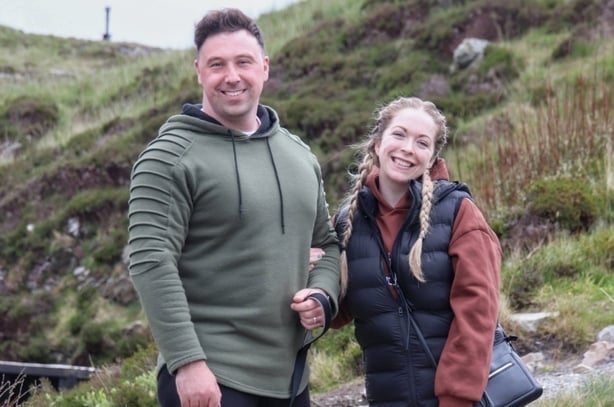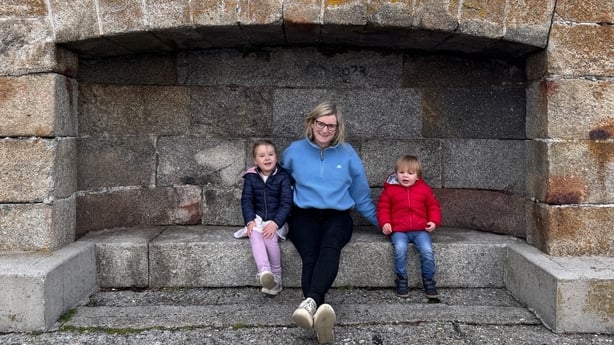Since the rollout of State-funded fertility treatment in September 2023, around 1,700 couples have been referred for IVF.
The Health Service Executive said initially around 100 couples a month were being referred.
However, in the latter stages of last year, it had risen by 50% to 150 couples a month.
Karen Creed speaks to two women about their fertility struggles.
Siobháin O'Reilly and her husband Dean have been trying for a baby for four years.
She shares their story openly on TikTok under the heading Seed of Hope, updating followers on her hopes and struggles to become a parent.
Since January last year she has been on the public scheme and a few weeks ago she was referred for IVF.
"It was such a relief," she said.
"I work in customer service, so I don't have a lot of money. So, the thoughts of me being able to go down the route of IVF, to pay for it myself would just probably be later, down the line kind of thing. The fact that I'm obviously being able to avail of this scheme is, honestly, amazing."
The average cost of one round of IVF in Ireland is €5,000.
While costs will be covered for Siobháin, the process is not without its obstacles as she highlights the criteria that must be met for fertility treatment.
Age is not an issue for her, but she knows weight might be.
"There are so many criteria that you actually have to meet. So initially, I knew obviously your BMI (body mass index) had to be low. I reached out to a fitness instructor.
"My BMI was 32 and I got it down to 28, thank God. I'm willing to do anything to make sure that I have a baby. To be a mam is one of the things in life that I've always aspired to be."
The difficulty to conceive began in 2020.
"Myself and my husband, we had issues from the get-go, so we didn't get pregnant instantly," Siobháin said.

When she did eventually become pregnant, it went "downhill from there".
"Basically, miscarriage after miscarriage and so I've had four miscarriages."
It was not until after the third miscarriage that investigations began and, through tests, she found out she had a unicornuate uterus and one kidney.
Read more: Number availing of free IVF treatment rises by 50%
Siobháin is aware of the success rates of IVF and that there is a chance it may not work.
"With the IVF, obviously once it fails with the public scheme, then you're not able to avail of the service again. So obviously that's at the back of my head."
She is grateful her husband Dean is as open as she is about this process of having a baby.
"I'm glad that he is talking about it as well and not kind of keeping it in."
She understands that for many people it can be too sensitive to speak about.
Siobháin has taken the approach that when people ask if they have children she replies: "We would like to but we are actually having issues conceiving."
Her reason for sharing her story is not just for her "need to talk about it" but to help others who are in a similar situation.
"I see loads of people online, they're going through IVF, but they weren't kind of announcing that they were doing the public schemes.
"So, I was wondering, are these people on the public scheme or are they paying for it out of their own pocket? So that's what was confusing me about it.
"There was nobody out there that's actually saying 'I am going through the public scheme, and this is what you need to do, this is what you need to have ready and stuff like that for the appointments'."
Go down 'every rabbit hole'
Sarah Magner, a pharmacist and mother-of-two, also wants to see more public awareness around fertility and the IVF journey.
"When you're in it, it's a long road. You don't know how long it's going to be for some people. If you are very lucky. It works the first time."
She said most go down "every rabbit hole to try and support the IVF working" and that the financial and emotional toll can be overwhelming.
"There are people literally putting off doing IVF, waiting for announcements that might or might not come and we all know an IVF time is critical, putting it off could be the difference between having a child and not having a child."
While she welcomes the introduction of public-funded IVF, she does not think it is scratching the surface of the demand.
"The more into the world of IVF I've become, the more I've realised that just going into the clinic and doing IVF and getting your baby is for the lucky few.
"For a lot of people, they must move on to other means, be it donor egg or donor sperm or embryo adoption or surrogacy.
"It's taking regulation and financing of it an awful long time to catch up with what's happening in the world of science.
"The first IVF baby was born the year before I was born. And we are still not at a place in Ireland 46 years, nearly 47 years later, where it's treated like a condition in any other sense."

Sarah thinks part of the problem around it not getting prioritised is that it is not discussed as openly as other health conditions.
"Fertility and infertility, it’s such a private thing and I understand that because you don't want to hurt your own emotions.
"So, the less people you tell, the less people you have to break their hearts when you tell them it doesn't work. People knowing is a pressure but there should be no stigma around your means to having a family.
"If one in six of the country had blood pressure, the whole country would be talking about it."
She says at 37 years old embarking on IVF she "didn't know where to turn to or who to ask questions to".
She also reflects on the attitudes in society, where, for many years, "the full focus was on maybe preventing unplanned pregnancies in your life, but nobody told you that you also need to be thinking about future you. Maybe you in ten years’ time."
She said it is easy to be an expert on this huge area of fertility many years since she first embarked on it.
"If I was to start again with all the knowledge I have now, I'd be a lot wiser in the questions I ask."






